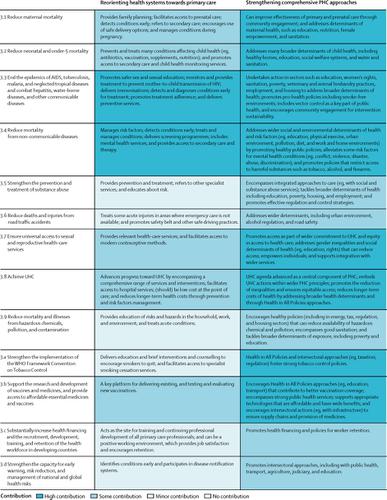Our official English website, www.x-mol.net, welcomes your
feedback! (Note: you will need to create a separate account there.)
Revisiting Alma-Ata: what is the role of primary health care in achieving the Sustainable Development Goals?
The Lancet ( IF 98.4 ) Pub Date : 2018-10-20 , DOI: 10.1016/s0140-6736(18)31829-4 Thomas Hone , James Macinko , Christopher Millett
The Lancet ( IF 98.4 ) Pub Date : 2018-10-20 , DOI: 10.1016/s0140-6736(18)31829-4 Thomas Hone , James Macinko , Christopher Millett

|
The Sustainable Development Goals (SDGs) are now steering the global health and development agendas. Notably, the SDGs contain no mention of primary health care, reflecting the disappointing implementation of the Alma-Ata declaration of 1978 over the past four decades. The draft Astana declaration (Alma-Ata 2·0), released in June, 2018, restates the key principles of primary health care and renews these as driving forces for achieving the SDGs, emphasising universal health coverage. We use accumulating evidence to show that countries that reoriente their health systems towards primary care are better placed to achieve the SDGs than those with hospital-focused systems or low investment in health. We then argue that an even bolder approach, which fully embraces the Alma-Ata vision of primary health care, could deliver substantially greater SDG progress, by addressing the wider determinants of health, promoting equity and social justice throughout society, empowering communities, and being a catalyst for advancing and amplifying universal health coverage and synergies among SDGs.
中文翻译:

重温阿拉木图:初级卫生保健在实现可持续发展目标中的作用是什么?
可持续发展目标(SDG)现在正在指导全球卫生与发展议程。值得注意的是,可持续发展目标未提及初级卫生保健,这反映了过去四个十年来1978年的《阿拉木图宣言》的执行令人失望。2018年6月发布的阿斯塔纳宣言草案(Alma-Ata 2·0)重申了初级卫生保健的主要原则,并将其更新为实现可持续发展目标的推动力,强调了全民健康覆盖。我们使用积累的证据表明,与那些以医院为中心或医疗投资较低的国家相比,将其医疗系统重新定位为初级保健的国家更容易实现可持续发展目标。然后,我们争论说,一种甚至更大胆的方法,完全包含了Alma-Ata的初级卫生保健构想,
更新日期:2018-10-19
中文翻译:

重温阿拉木图:初级卫生保健在实现可持续发展目标中的作用是什么?
可持续发展目标(SDG)现在正在指导全球卫生与发展议程。值得注意的是,可持续发展目标未提及初级卫生保健,这反映了过去四个十年来1978年的《阿拉木图宣言》的执行令人失望。2018年6月发布的阿斯塔纳宣言草案(Alma-Ata 2·0)重申了初级卫生保健的主要原则,并将其更新为实现可持续发展目标的推动力,强调了全民健康覆盖。我们使用积累的证据表明,与那些以医院为中心或医疗投资较低的国家相比,将其医疗系统重新定位为初级保健的国家更容易实现可持续发展目标。然后,我们争论说,一种甚至更大胆的方法,完全包含了Alma-Ata的初级卫生保健构想,











































 京公网安备 11010802027423号
京公网安备 11010802027423号